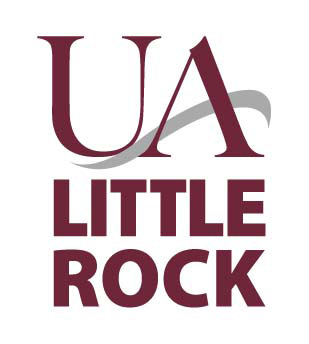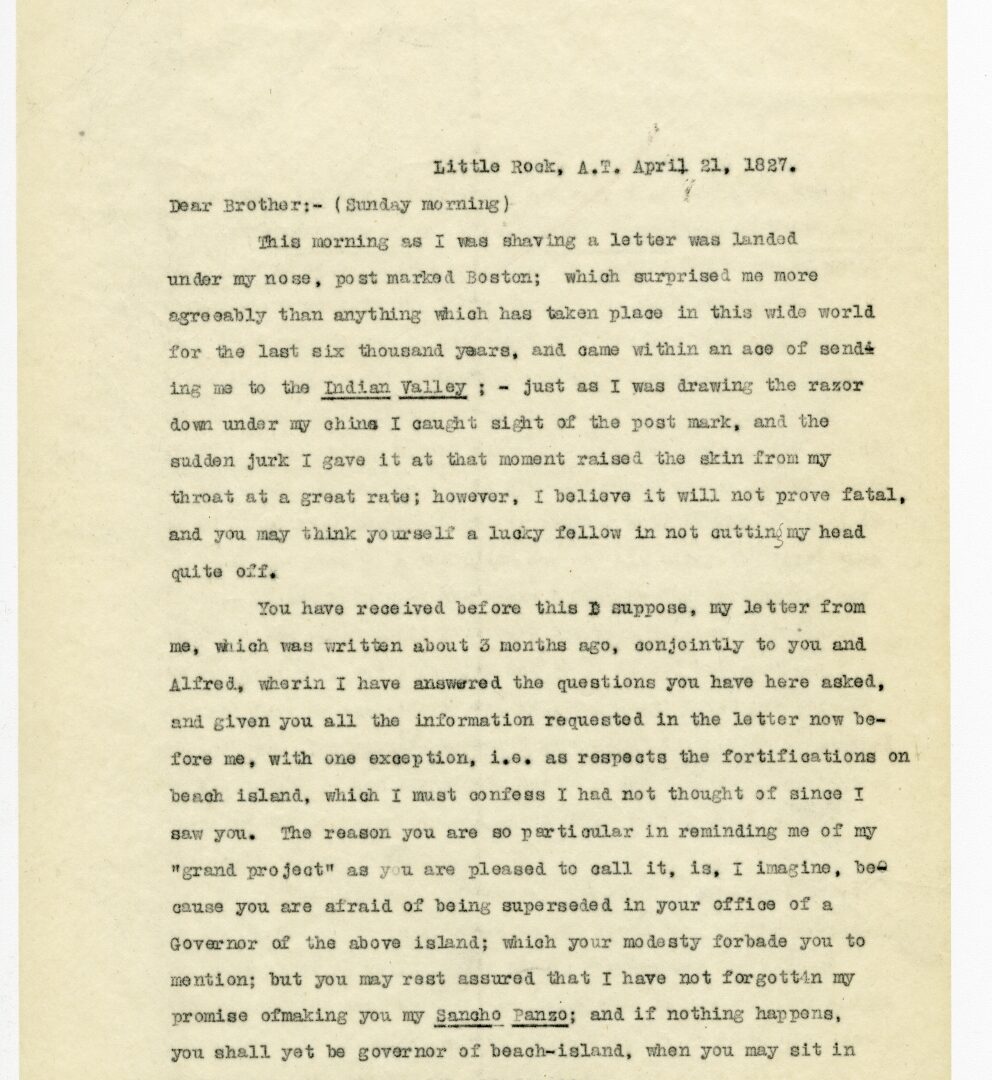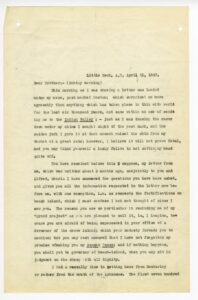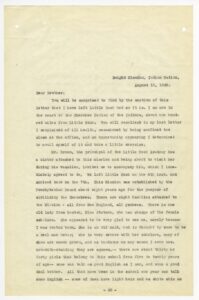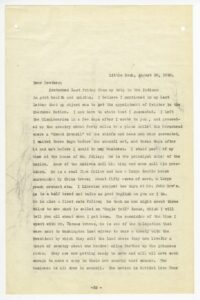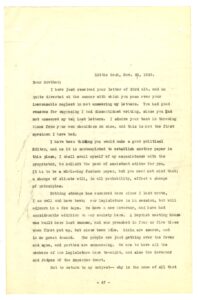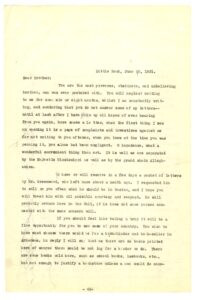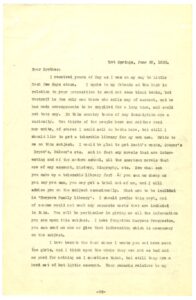Arkansas Before Statehood
Hiram Abiff Whittington’s letters, which he wrote to his brother Granville Whittington in the late 1820s and early 1830s, remain one of the most valuable personal accounts of daily life in Arkansas shortly before Arkansas Territory became a state. Whittington was one of many entrepreneurial men who moved to Arkansas seeking exciting opportunities and new life in what was at the time the frontier of the United States. He was born in 1805 in Boston, Massachusetts, and moved to Little Rock in 1826. He was a skilled printer and book binder and had experience in book trade and publishing. In Little Rock, he worked as a printer with the Arkansas Gazette but in 1832 he moved to Hot Springs. He settled there hoping that the spring waters would have a healing effect on his deteriorating health. He opened several businesses, created first lending library in Arkansas, and established a successful political career, eventually serving as a state representative. In 1836, Whittington returned to Boston to marry Mary Burnham. The two moved back to Hot Springs and had six children. Whittington died in 1890 in Hot Springs.
Whittington’s letters provide an account into the daily life in Arkansas Territory from a perspective of a white middle class educated man. Access to Whittington’s original letters, which are housed at the Special Collections Department of the University of Arkansas in Fayetteville, is limited due to the documents’ fragility. To make these rare and extremely valuable records more accessible to researchers, educators, and students, Whittington’s letters were typed. Activities in “Arkansas Before Statehood” are based on six typescript letters (typed copies of the original letters) selected from a collection of sixteen letters housed at the Center for Arkansas History and Culture in Little Rock (Hiram A. Whittington Papers, 1824-1834, UALR.MS.0157).
Note for educators: Each letter and thus each exercise in “Arkansas Before Statehood” can be used as a separate complete activity to enrich a discussion on Arkansas history shortly before statehood. However, each letter highlights different aspects of life in Arkansas Territory so any number and combination of letters and corresponding exercises can form a set. All the six letters showcased in “Arkansas Before Statehood” and thus all the corresponding exercises can be also used as a set to create a more comprehensive and complex historical picture. The latter may work particularly efficiently if you divide your students into groups and assign one letter to each group.
Hiram Abiff Whittington’s letters, which he wrote to his brother Granville Whittington in the late 1820s and early 1830s, remain one of the most valuable personal accounts of daily life in Arkansas shortly before Arkansas Territory became a state. Whittington was one of many entrepreneurial men who moved to Arkansas seeking exciting opportunities and new life in what was at the time the frontier of the United States. He was born in 1805 in Boston, Massachusetts, and moved to Little Rock in 1826. He was a skilled printer and book binder and had experience in book trade and publishing. In Little Rock, he worked as a printer with the Arkansas Gazette but in 1832 he moved to Hot Springs. He settled there hoping that the spring waters would have a healing effect on his deteriorating health. He opened several businesses, created first lending library in Arkansas, and established a successful political career, eventually serving as a state representative. In 1836, Whittington returned to Boston to marry Mary Burnham. The two moved back to Hot Springs and had six children. Whittington died in 1890 in Hot Springs.
Whittington’s letters provide an account into the daily life in Arkansas Territory from a perspective of a white middle class educated man. Access to Whittington’s original letters, which are housed at the Special Collections Department of the University of Arkansas in Fayetteville, is limited due to the documents’ fragility. To make these rare and extremely valuable records more accessible to researchers, educators, and students, Whittington’s letters were typed. Activities in “Arkansas Before Statehood” are based on six typescript letters (typed copies of the original letters) selected from a collection of sixteen letters housed at the Center for Arkansas History and Culture in Little Rock (Hiram A. Whittington Papers, 1824-1834, UALR.MS.0157).
Note for educators: Each letter and thus each exercise in “Arkansas Before Statehood” can be used as a separate complete activity to enrich a discussion on Arkansas history shortly before statehood. However, each letter highlights different aspects of life in Arkansas Territory so any number and combination of letters and corresponding exercises can form a set. All the six letters showcased in “Arkansas Before Statehood” and thus all the corresponding exercises can be also used as a set to create a more comprehensive and complex historical picture. The latter may work particularly efficiently if you divide your students into groups and assign one letter to each group.
Hiram Abiff Whittington’s letters, which he wrote to his brother Granville Whittington in the late 1820s and early 1830s, remain one of the most valuable personal accounts of daily life in Arkansas shortly before Arkansas Territory became a state. Whittington was one of many entrepreneurial men who moved to Arkansas seeking exciting opportunities and new life in what was at the time the frontier of the United States. He was born in 1805 in Boston, Massachusetts, and moved to Little Rock in 1826. He was a skilled printer and book binder and had experience in book trade and publishing. In Little Rock, he worked as a printer with the Arkansas Gazette but in 1832 he moved to Hot Springs. He settled there hoping that the spring waters would have a healing effect on his deteriorating health. He opened several businesses, created first lending library in Arkansas, and established a successful political career, eventually serving as a state representative. In 1836, Whittington returned to Boston to marry Mary Burnham. The two moved back to Hot Springs and had six children. Whittington died in 1890 in Hot Springs.
Whittington’s letters provide an account into the daily life in Arkansas Territory from a perspective of a white middle class educated man. Access to Whittington’s original letters, which are housed at the Special Collections Department of the University of Arkansas in Fayetteville, is limited due to the documents’ fragility. To make these rare and extremely valuable records more accessible to researchers, educators, and students, Whittington’s letters were typed. Activities in “Arkansas Before Statehood” are based on six typescript letters (typed copies of the original letters) selected from a collection of sixteen letters housed at the Center for Arkansas History and Culture in Little Rock (Hiram A. Whittington Papers, 1824-1834, UALR.MS.0157).
Note for educators: Each letter and thus each exercise in “Arkansas Before Statehood” can be used as a separate complete activity to enrich a discussion on Arkansas history shortly before statehood. However, each letter highlights different aspects of life in Arkansas Territory so any number and combination of letters and corresponding exercises can form a set. All the six letters showcased in “Arkansas Before Statehood” and thus all the corresponding exercises can be also used as a set to create a more comprehensive and complex historical picture. The latter may work particularly efficiently if you divide your students into groups and assign one letter to each group.
Hiram Abiff Whittington’s letters, which he wrote to his brother Granville Whittington in the late 1820s and early 1830s, remain one of the most valuable personal accounts of daily life in Arkansas shortly before Arkansas Territory became a state. Whittington was one of many entrepreneurial men who moved to Arkansas seeking exciting opportunities and new life in what was at the time the frontier of the United States. He was born in 1805 in Boston, Massachusetts, and moved to Little Rock in 1826. He was a skilled printer and book binder and had experience in book trade and publishing. In Little Rock, he worked as a printer with the Arkansas Gazette but in 1832 he moved to Hot Springs. He settled there hoping that the spring waters would have a healing effect on his deteriorating health. He opened several businesses, created first lending library in Arkansas, and established a successful political career, eventually serving as a state representative. In 1836, Whittington returned to Boston to marry Mary Burnham. The two moved back to Hot Springs and had six children. Whittington died in 1890 in Hot Springs.
Whittington’s letters provide an account into the daily life in Arkansas Territory from a perspective of a white middle class educated man. Access to Whittington’s original letters, which are housed at the Special Collections Department of the University of Arkansas in Fayetteville, is limited due to the documents’ fragility. To make these rare and extremely valuable records more accessible to researchers, educators, and students, Whittington’s letters were typed. Activities in “Arkansas Before Statehood” are based on six typescript letters (typed copies of the original letters) selected from a collection of sixteen letters housed at the Center for Arkansas History and Culture in Little Rock (Hiram A. Whittington Papers, 1824-1834, UALR.MS.0157).
Note for educators: Each letter and thus each exercise in “Arkansas Before Statehood” can be used as a separate complete activity to enrich a discussion on Arkansas history shortly before statehood. However, each letter highlights different aspects of life in Arkansas Territory so any number and combination of letters and corresponding exercises can form a set. All the six letters showcased in “Arkansas Before Statehood” and thus all the corresponding exercises can be also used as a set to create a more comprehensive and complex historical picture. The latter may work particularly efficiently if you divide your students into groups and assign one letter to each group.
Hiram Abiff Whittington’s letters, which he wrote to his brother Granville Whittington in the late 1820s and early 1830s, remain one of the most valuable personal accounts of daily life in Arkansas shortly before Arkansas Territory became a state. Whittington was one of many entrepreneurial men who moved to Arkansas seeking exciting opportunities and new life in what was at the time the frontier of the United States. He was born in 1805 in Boston, Massachusetts, and moved to Little Rock in 1826. He was a skilled printer and book binder and had experience in book trade and publishing. In Little Rock, he worked as a printer with the Arkansas Gazette but in 1832 he moved to Hot Springs. He settled there hoping that the spring waters would have a healing effect on his deteriorating health. He opened several businesses, created first lending library in Arkansas, and established a successful political career, eventually serving as a state representative. In 1836, Whittington returned to Boston to marry Mary Burnham. The two moved back to Hot Springs and had six children. Whittington died in 1890 in Hot Springs.
Whittington’s letters provide an account into the daily life in Arkansas Territory from a perspective of a white middle class educated man. Access to Whittington’s original letters, which are housed at the Special Collections Department of the University of Arkansas in Fayetteville, is limited due to the documents’ fragility. To make these rare and extremely valuable records more accessible to researchers, educators, and students, Whittington’s letters were typed. Activities in “Arkansas Before Statehood” are based on six typescript letters (typed copies of the original letters) selected from a collection of sixteen letters housed at the Center for Arkansas History and Culture in Little Rock (Hiram A. Whittington Papers, 1824-1834, UALR.MS.0157).
Note for educators: Each letter and thus each exercise in “Arkansas Before Statehood” can be used as a separate complete activity to enrich a discussion on Arkansas history shortly before statehood. However, each letter highlights different aspects of life in Arkansas Territory so any number and combination of letters and corresponding exercises can form a set. All the six letters showcased in “Arkansas Before Statehood” and thus all the corresponding exercises can be also used as a set to create a more comprehensive and complex historical picture. The latter may work particularly efficiently if you divide your students into groups and assign one letter to each group.
Hiram Abiff Whittington’s letters, which he wrote to his brother Granville Whittington in the late 1820s and early 1830s, remain one of the most valuable personal accounts of daily life in Arkansas shortly before Arkansas Territory became a state. Whittington was one of many entrepreneurial men who moved to Arkansas seeking exciting opportunities and new life in what was at the time the frontier of the United States. He was born in 1805 in Boston, Massachusetts, and moved to Little Rock in 1826. He was a skilled printer and book binder and had experience in book trade and publishing. In Little Rock, he worked as a printer with the Arkansas Gazette but in 1832 he moved to Hot Springs. He settled there hoping that the spring waters would have a healing effect on his deteriorating health. He opened several businesses, created first lending library in Arkansas, and established a successful political career, eventually serving as a state representative. In 1836, Whittington returned to Boston to marry Mary Burnham. The two moved back to Hot Springs and had six children. Whittington died in 1890 in Hot Springs.
Whittington’s letters provide an account into the daily life in Arkansas Territory from a perspective of a white middle class educated man. Access to Whittington’s original letters, which are housed at the Special Collections Department of the University of Arkansas in Fayetteville, is limited due to the documents’ fragility. To make these rare and extremely valuable records more accessible to researchers, educators, and students, Whittington’s letters were typed. Activities in “Arkansas Before Statehood” are based on six typescript letters (typed copies of the original letters) selected from a collection of sixteen letters housed at the Center for Arkansas History and Culture in Little Rock (Hiram A. Whittington Papers, 1824-1834, UALR.MS.0157).
Note for educators: Each letter and thus each exercise in “Arkansas Before Statehood” can be used as a separate complete activity to enrich a discussion on Arkansas history shortly before statehood. However, each letter highlights different aspects of life in Arkansas Territory so any number and combination of letters and corresponding exercises can form a set. All the six letters showcased in “Arkansas Before Statehood” and thus all the corresponding exercises can be also used as a set to create a more comprehensive and complex historical picture. The latter may work particularly efficiently if you divide your students into groups and assign one letter to each group.
